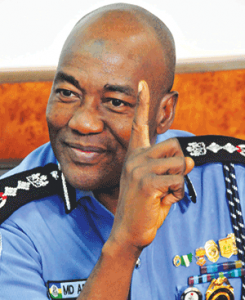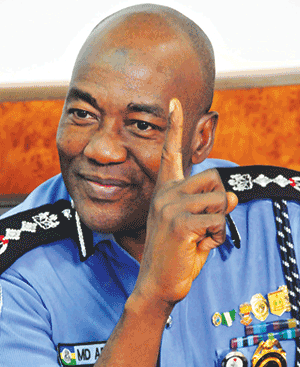Culture of cover-up and stalling…
But it appears that the culture of cover-up of crimes and stalling of prosecution is entrenched more within the Nigeria police than in other uniformed services. Compare the above three cases (the Apo 6, the Benin killings, and Onitsha killings) with similar cases in which personnel of the armed forces were involved in misconduct and abuse.

On July 25, 2005, one Lt. Felix Olanrenwaju Odunlami shot a commercial motorcyclist, Peter Edeh, in the mouth at Allen Roundabout, Ikeja, killing him instantly, for hitting his car from behind. The naval officer shot the motorcyclist even as he was kneeling down, begging him for forgiveness.
On January 27, 2006 the naval officer was arraigned before a General Court Martial on three counts of manslaughter, loss of service item (for not being able to convincingly account for four rounds of 9mm live ammunition) and conduct to the prejudice of service discipline. At the conclusion of his trial in July 2006, the Court Martial convicted him on counts one and two, and sentenced him for life, for manslaughter and dismissed him from service on count two.
Odunlami ran to the Court of Appeal, Lagos, but the appellate court, in its judgment on January 31, 2011, upheld the Court Martial’s decision and dismissed his appeal. He, again, approached the Supreme Court to appeal the life sentence passed on him by the Court of Appeal, Lagos, as well as his dismissal by a General Court Martial. But the Supreme Court on Friday June 7, 2013 affirmed the sentence.
The will to check impunity
Although the case of one Okechukwu Agu, which happened in 2009 in Enugu, did not result in death (but permanent disability), it, nonetheless, underscores the comparative willingness by military authorities – as opposed to police authorities – to investigate and punish abuse and misconduct by their personnel. This is essential to deter and check impunity.
The then 70-year-old Agu was brutalised and rendered blind by an army officer, Sergeant Oga, attached to 82 Division, Nigerian Army, Enugu for ‘blocking his way’. Today, the soldier is facing trial in an Enugu High Court after he was court-marshalled and dismissed from the army. Judgment is due to be delivered on this case any moment the trial judge gives a date.
A cheering departure from the pattern of stalling?
Recent media reports indicate that Olusegun Fabunmi, the Divisional Police Officer in charge of Pen Cinema, Agege, who shot Ademola Aderinto during the January 2012 fuel subsidy protests in Lagos, has been dismissed from the police and facing prosecution in a Lagos High Court. Since this incident occurred about 15 months ago, the Network on Police Reform in Nigeria (NOPRIN) has issued a number of public calls seeking from the police hierarchy and the Police Service Commission (PSC) update on this case without any response.
If, indeed, Fabunmi has been dismissed and now facing prosecution for murder, that will be a cheering and welcome departure from the pattern of stalling and indifference in the Nigeria Police Force (NPF) in cases of serious violation such as this. Usually, the police hierarchy would prolong ‘investigation’ and allow public attention to shift. At best, the affected police officer would be transferred, making it difficult to locate him/her in the system. The investigating agencies will often give up.
It is curious that it took the PSC (under Parry Osayande) close to 15 months – and few days to the end of its tenure – to decide on this serious violation during the commission’s plenary on April 3 in Abuja. The performance of the commission under Osayande was dismal. Police accountability under the immediate past PSC was practically absent. And this failure by the PSC to discharge its constitutional mandate of enforcing discipline and accountability within the police accounts for the impunity which protects perpetrators.
It is encouraging that the Lagos State Office of the Public Defender is prosecuting this case at the Lagos High Court. With this development, it is hoped that it will not end up like the ‘Apo 6’ in which the principal suspect ‘disappeared’ from police custody, and eight years after, not a single suspect has been effectively prosecuted and brought to account.
Waiting for justice or waiting in vain?
On September 20, 2012, 36-year-old Engr. Ugochukwu Ozuah was shot and killed unlawfully – according to witnesses – by a policeman five days after his wedding. This happened on Gbagada Expressway, Lagos, next to UPS (United Parcel Service) office as he went to drop off a classmate at the junction, so he could get a taxi home. His killers are yet to be brought to account more than nine months after, despite promises by the Inspector General of Police (IGP) that the killers would be fished out and prosecuted.
The late Ugochukwu’s young widow, Joan, and other members of the victim’s family are still awaiting the outcome of investigation by the Special Investigative team set up by then IGP, Mohammed Abubakar, to unravel the circumstances surrounding the late engineer’s death and bring the perpetrators to book.
“I can’t forget that fateful night of September 20, when the police shot you in the chest and left you to die in cold blood…” Joan lamented in a tribute to her late husband.




